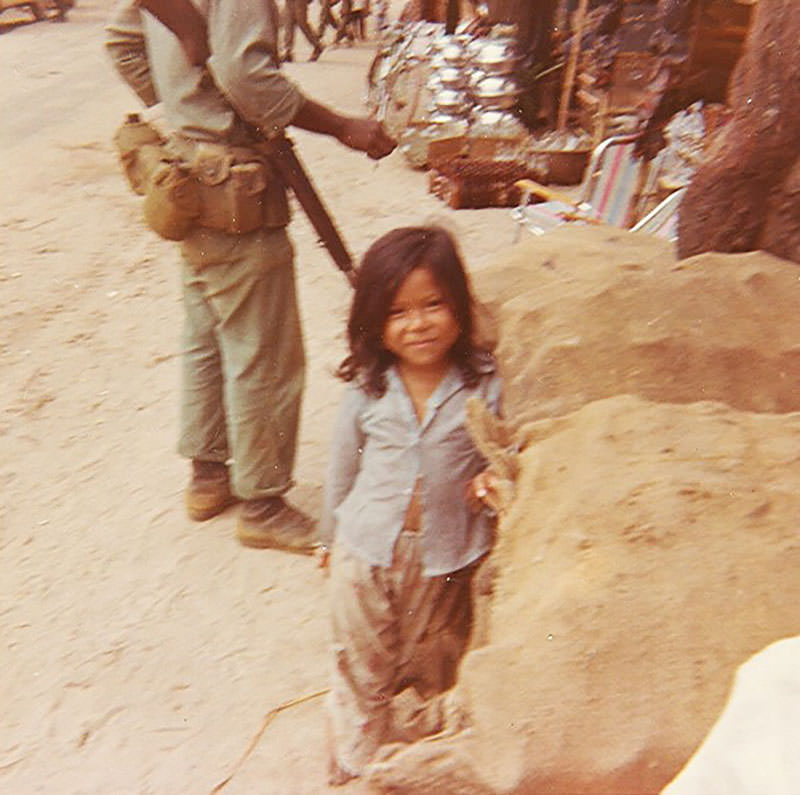We would take a 6-by truck into An Tan from Ky Ha, to buy soda or beer or sex. A line of little thatched-roof kiosks, some of them walled with flattened beer cans from our trash dumps, strung along a dirt road rutted with land-mine craters, a cloud of reddish dust hanging perpetually over it. I was standing with some other Marines in the scant shade of a scraggly areca tree, buying dusty bottles of soda from the girls who sold them from the baskets they carried. I joked with one girl, maybe 8 years old; she had a dirty face and a beautiful smile. She wanted to try out her English with me, and I was correcting her pronunciation: No, say moth-er-fuck-er, not motha fucka. An amtrack—the name Marines used for the massive 32-ton amphibious tracked vehicles that the Army called Armored Personnel Carriers—clanked to a halt nearby, and the girl ran over and lifted her basket high over her head like an offering to the gods of war. A Marine, deeply tanned, his utilities and helmet and skin covered with fine red powder that was reamed on his face with rivulets of sweat, leaned over and snatched a bottle from the girl, knocked its cap off on the edge of the vehicle and drained the foaming Coke. 100 p’s, the girl yelled up at him shrilly. 100 piastres. What she was owed. He stared at her. 100 p’s, she screamed. He threw the bottle at her, hard and fast; she stepped to the side as it whizzed past her head, planted her legs apart, and stared up at him. Her shirt was ragged, held by one button. Her chest was heaving. 100 p’s, she insisted. Leave, I thought. Get out of there, kid. The amtrack was scored with bullet rakings, battered, its tracks caked with mud; the men on it staring out with flat indifference or with that crazy grunt light in their eyes. The Marine took out a .45, leaned over the side again, and pointed it at the girl’s forehead. I didn’t move. A tableau: girl, 8 or 9 or maybe older; amtrack, 32-ton; Marine, .45. Di-di, you little gook bitch, he said. Moth-er fuck-er, she said clearly. 100 p’s. He racked the handgun. She didn’t move. 100 p’s, she screamed up at him. Di-di mau, he said, and pushed the handgun closer. My M-14 was slung with the barrel forward and down so it could be brought up quickly, and I moved my finger to the trigger. I remember the wet slick feel of the trigger under my skin. I still feel it. I could feel his finger was tightening on his trigger as, or because, my finger was tightening on mine. The girl’s hands gripped the basket, her eyes locked to the Marine’s. I understood she would die rather than move. I understood that we would lose the war. The realization was as clear as if someone had spoken a sentence into my ears. We will lose the war. For shit sake, a voice with a thick, weary Southern accent said from the amtrack, and a skinny Marine leaned over the side and dropped a hundred-piastre note to the ground. It fluttered near the girl’s feet. She didn’t look at it. The other Marine shook his head in disgust, snorted, pulled up the pistol. The girl remained where she was. After a while, she bent down and took the money. I turned away and went back to my friends. It had been a day when nothing happened.

An Tan, 1966, photo by author
Wayne Karlin served in the Marine Corps in the Việt Nam War. He has published nine novels, a collection of short stories, and three works of nonfiction: He was the pro bono American editor of the Voices From Việt Nam series for Curbstone Press, a project to publish Vietnamese authors in translations, and the writer and coproducer of the radio program “Artists Born of War,” interviewing American veteran writers and Vietnamese writers, as part of the series Shared Weight. He has received six State of Maryland Individual Artist Awards in Fiction, two Fellowships from the National Endowment for the Arts, the Paterson Prize in Fiction for 1999, the Vietnam Veterans of American Excellence in the Arts Award in 2005, and the 2019 Juniper Prize for Fiction.


0 Comments